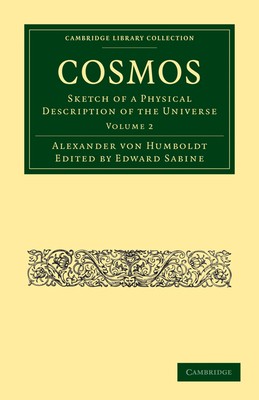
- We will send in 10–14 business days.
- Author: Alexander Von Humboldt
- Publisher: Cambridge University Press
- ISBN-10: 1108013643
- ISBN-13: 9781108013642
- Format: 14 x 21.6 x 2.9 cm, minkšti viršeliai
- Language: English
- SAVE -10% with code: EXTRA
Reviews
Description
Polymath Alexander von Humboldt (1769-1859), a self-described 'scientific traveller', was one of the most respected scientists of his time. Humboldt's wanderlust led him across Europe and to South America, Mexico, the U.S. and Russia, and his voyages and observations resulted in the discovery of many species previously unknown to Europeans. Originating as lectures delivered in Berlin and Paris (1827-1828), his two-volume Cosmos: Sketch of a Physical Description of the Universe (1845-1860) represented the culmination of his lifelong interest in understanding the physical world. As Humboldt writes, 'I ever desired to discern physical phenomena in their widest mutual connection, and to comprehend Nature as a whole, animated and moved by inward forces'. Volume 2 (1848) reviews poetic descriptions of nature as well as landscape painting from antiquity through to modernity, before using the same time-span to examine a 'History of the Physical Contemplation of the Universe'.
EXTRA 10 % discount with code: EXTRA
The promotion ends in 22d.06:45:10
The discount code is valid when purchasing from 10 €. Discounts do not stack.
- Author: Alexander Von Humboldt
- Publisher: Cambridge University Press
- ISBN-10: 1108013643
- ISBN-13: 9781108013642
- Format: 14 x 21.6 x 2.9 cm, minkšti viršeliai
- Language: English English
Polymath Alexander von Humboldt (1769-1859), a self-described 'scientific traveller', was one of the most respected scientists of his time. Humboldt's wanderlust led him across Europe and to South America, Mexico, the U.S. and Russia, and his voyages and observations resulted in the discovery of many species previously unknown to Europeans. Originating as lectures delivered in Berlin and Paris (1827-1828), his two-volume Cosmos: Sketch of a Physical Description of the Universe (1845-1860) represented the culmination of his lifelong interest in understanding the physical world. As Humboldt writes, 'I ever desired to discern physical phenomena in their widest mutual connection, and to comprehend Nature as a whole, animated and moved by inward forces'. Volume 2 (1848) reviews poetic descriptions of nature as well as landscape painting from antiquity through to modernity, before using the same time-span to examine a 'History of the Physical Contemplation of the Universe'.


Reviews